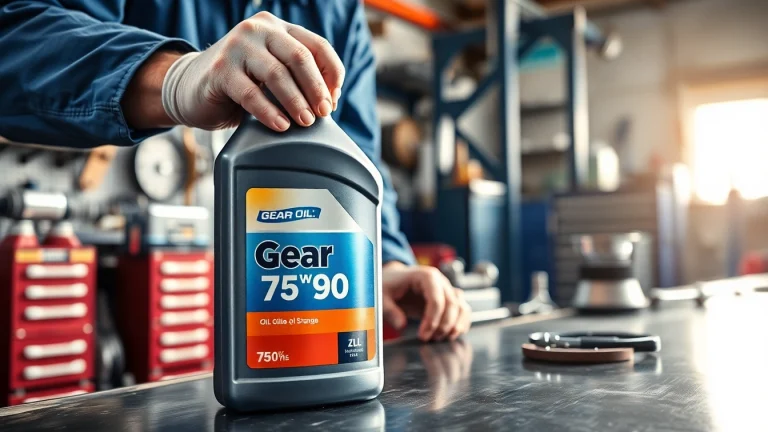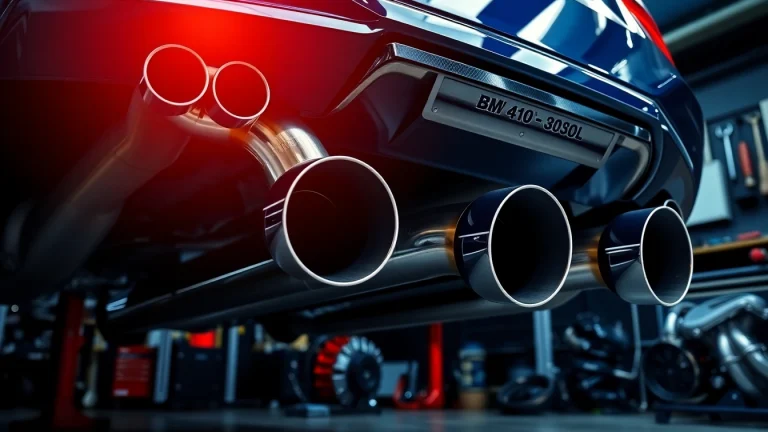
The Essential Guide to Choosing Gear Oil 75W90: Performance, Benefits, and Applications
Understanding Gear Oil 75W90
What is Gear Oil 75W90?
Gear oil 75W90 is a specialized lubricant formulated for a wide range of gear applications, including manual transmissions, transfer cases, and differentials. It is designed to manage the demands of heavy loads and varying operating conditions while maintaining a consistent viscosity. The designation “75W90” indicates the oil’s viscosity characteristics: ’75W’ denotes its performance at lower temperatures, while ’90’ refers to its thickness when heated. This balance makes it a highly versatile option, ideal for both performance vehicles and everyday driving.
Characteristics and Additives
High-quality gear oils like 75W90 contain various additives that enhance their performance. These include:
- Anti-wear additives: Protect gear surfaces from wear and tear, extending the life of the components.
- Friction modifiers: Help reduce friction between moving parts, improving efficiency and performance.
- Extreme pressure (EP) additives: Provide additional protection under high-load and high-pressure conditions.
- Oxidation inhibitors: Prevent the oil from breaking down over time, ensuring long-lasting protection.
These additives combined create a lubricant that can perform exceptionally well in diverse driving conditions and temperatures, making it suitable for any vehicle’s transmission or differential system.
Typical Applications and Uses
Gear oil 75W90 is widely utilized across various automotive applications, primarily because of its ability to deliver enhanced performance in both performance-oriented and standard vehicles. It is often recommended for:
- Manual Transmissions: Provides smooth shifting and protects against gear wear.
- Differentials: Ensures optimal power transmission and minimizes friction loss.
- Transfer Cases: Useful in all-wheel-drive (AWD) and four-wheel-drive (4WD) vehicles where torque distribution is crucial.
The adaptability of 75W90 makes it a popular choice among mechanics and car enthusiasts alike, often recommended for both everyday drivers and performance vehicles seeking reliable lubrication.
Benefits of Using 75W90 Gear Oil
Enhanced Protection and Performance
Using a quality gear oil like 75W90 provides enhanced protection for your vehicle’s gear systems. The advanced formula offers an exceptional level of wear protection, ensuring that components last longer and operate more effectively. Tests have shown that vehicles using superior gear oil experience less wear on differential and transmission gears, which translates to lower maintenance costs over time.
Temperature Stability
One of the defining features of 75W90 gear oil is its excellent temperature stability. This oil remains effective across a broad temperature range, performing reliably in both cold and hot environments. In colder climates, it flows easily upon startup, ensuring immediate lubrication, while its thicker viscosity when heated provides robust protection against wear over time. This property is particularly beneficial for performance vehicles subjected to high operating temperatures during intense drives.
Improved Fuel Efficiency
Quality gear oil directly impacts a vehicle’s fuel efficiency. Because 75W90 gear oil is engineered to reduce friction between gears, it can lead to smoother operation and less energy loss. This can enhance a vehicle’s overall fuel economy, making it especially advantageous for those who drive long distances or use their vehicles for towing or hauling.
Comparing Gear Oil 75W90 with Other Viscosities
75W90 vs. 80W90
While both 75W90 and 80W90 gear oils serve similar purposes, they differ in viscosity at higher temperatures. 75W90 is thinner at elevated temperatures compared to 80W90, which makes 75W90 a better choice for varying temperatures and conditions. If your driving involves colder weather, then choosing 75W90 can be especially beneficial. Conversely, 80W90 might be preferred in situations where slightly thicker oil is required for increased protection against heavy loads or higher temperatures.
75W90 vs. 75W140
The primary difference between 75W90 and 75W140 lies in their ability to handle thermal expansion at high temperatures. The latter provides greater viscosity and is thicker under load compared to 75W90. For applications involving ultra-high loads or extreme torque and temperature, 75W140 may be needed. However, for regular driving conditions, especially in cooler climates, 75W90’s balanced viscosity makes it the superior choice.
Choosing the Right Viscosity for Your Vehicle
Choosing the correct gear oil involves considering multiple factors such as the vehicle’s make and model, the manufacturer’s recommendations, and the driving conditions you typically encounter. It’s crucial to consult your owner’s manual or a professional mechanic to ensure proper fluid selection. Ultimately, choosing the right gear oil can lead to significant improvements in your vehicle’s longevity and performance.
How to Change Gear Oil: A Step-by-Step Guide
Required Tools and Materials
Before starting the gear oil change, gather the following materials:
- 75W90 gear oil (ensure compatibility with your vehicle)
- Oil drain pan
- Wrench set or socket set
- Gear oil pump (if necessary)
- Clean rags or paper towels
- Safety goggles and gloves
Step-by-Step Guide to Fluid Change
Changing gear oil can be a straightforward task if done carefully. Follow these steps:
- Prepare Your Vehicle: Park your vehicle on a flat surface and engage the parking brake.
- Locate the Drain Plug: Find the drain plug on the differential or transmission (refer to your vehicle’s manual).
- Drain Old Oil: Position the oil drain pan under the drain plug, remove the plug, and allow the old oil to completely drain.
- Replace the Drain Plug: Once drained, clean the plug and reinstall it securely.
- Fill with New Oil: Using a gear oil pump, fill the system with 75W90 oil until it reaches the appropriate level. Check your manual for specifications.
- Check for Leaks: Start your vehicle and let it run for a few minutes, then check for any signs of leaks around the drain plug.
- Dispose of Old Oil: Dispose of the used oil responsibly at an authorized recycling center.
Maintaining Your Vehicle’s Gear System
Regular maintenance of your vehicle’s gear system is crucial for performance and longevity. Scheduling gear oil changes according to your vehicle’s maintenance schedule, checking for leaks, and periodically inspecting the condition of the oil can all contribute to a healthier and more efficient gear system. Utilizing high-quality gear oils, such as 75W90, enhances these efforts and provides the protection needed for optimal performance.
Where to Buy Quality Gear Oil 75W90
Top Retailers and Options Online
When looking to purchase gear oil 75W90, several reputable retailers and online platforms offer a variety of options. Stores like Walmart, AutoZone, O’Reilly Auto Parts, and local automotive supply stores typically carry high-quality brands. It’s also advisable to check online retailers like Amazon for competitive pricing and customer reviews.
What to Look for in Quality Gear Oil
Choosing the right gear oil involves more than just selecting a viscosity. Look for brands with proven reputations, check for necessary certifications (like API specifications), and consider the presence of beneficial additives. Additionally, synthetic options often provide superior protection and performance benefits over conventional oils, so they can be a worthwhile investment for your vehicle’s gear systems.
Consumer Reviews and Recommendations
Consulting consumer reviews can provide valuable insights into the performance of different 75W90 gear oils. Websites like BobIsTheOilGuy and various automotive forums offer discussions and recommendations from users’ personal experiences. Brands like Pennzoil, Mobil 1, and Valvoline consistently receive high ratings for their gear oils, reflecting reliability and performance satisfaction. Ensuring that you select a product with positive feedback can greatly enhance your confidence in your purchase.


